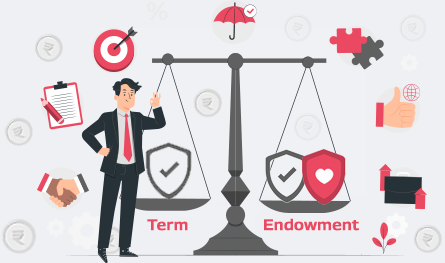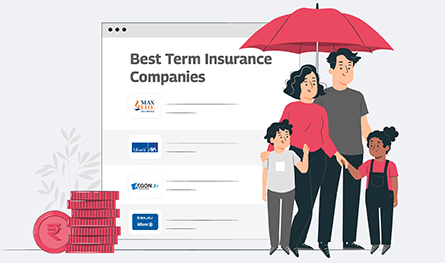Which is Better? Term vs Endowment Insurance

It is obvious for you to worry about your family’s financial security in your absence, but wouldn’t it be pleasant to have a plan, the benefits of which you can enjoy too with your family? Endowment insurance gives you the best of both worlds; insurance coverage along with long-term savings benefits takes care of your financial stress both in your absence and presence.

Basic Differences: Term Vs Endowment Insurance
This table gives you a better clarity on the differences of these two types of plans :
Factors |
Endowment Insurance |
Term Insurance |
Objective |
Insurance with long-term savings for wealth accumulation |
Provides only insurance coverage |
Suitability |
Suitable for those looking for life coverage as well as an investment plan |
Ideal for someone only interested in life coverage |
Benefits |
Extensive benefits are offered. Hence, premiums are on the higher side. |
Focuses on providing death benefits with a higher sum assured at a minimum cost. |
Sum Assured |
If you want a high sum assured, you need to pay a very high premium |
A sum assured as high as 15 to 20 times your income is available at a minimal price. |
Premiums Charged |
The premiums are higher since it offers a dual benefit |
Premiums are cheaper as it offer only life coverage with no benefit of returns |
Maturity Benefits |
It pays out a fixed amount, which is an accumulation of all your payments, returns on your investments, any bonuses acquired and other additions like top-up premiums. |
There is no maturity benefit. Instead, payout happens with the policyholder’s demise. |
Withdrawal Benefits |
Withdrawal benefits are offered in case of emergency after a few years only. |
No such benefit is incorporated in term insurance. |
There are tax benefits on the invested premium as well as the maturity amount paid out post-completion of policy tenure. A deduction on your premium up to rs. 1.5 lakh annually is allowed under Section 80C of the Income Tax Act of 1961. Also, the maturity amount is tax-exempt under 10(10D), subject to conditions mentioned in the policy. |
The tax benefits are similar to endowment insurance plans. However, since there is no maturity benefit, an exemption of 10(10D) applies to the sum assured amount only. |
|
Benefits of Riders |
Three common riders can be added to your basic policy:
|
The riders that can be added here are similar:
|
Now that the differences are clear, you must know how to decide which policy you should choose and what factors to consider as it has a significant impact on your financial condition:
1. Financial Goals:
These goals are as unique as a person's DNA. So, you need to consider your current financial condition along with your financial future and what you intend to do at policy maturity. These decisions also heavily depend on your lifestyle, number of dependents, and number of earners in your family. If you have many people depending on your income, you might want to go for a lower premium and higher sum assured offered by term insurance. If you are concerned about your financial future along with your children, probably endowment insurance is a better choice.
2. Current and Future Expenditures:
If you are engaged in hazardous work and fear for your family’s financial future in case of your untimely and accidental death, an endowment insurance plan that gives you the flexibility of partial withdrawals would be best suited for you. If you are comfortable waiting for the completion of policy tenure to get the benefit in your absence, a term plan should be good enough for you.
3. Disposable Income:
It is important for any long-term investment plan to continue payment of premiums without fail. You need to calculate the disposable income and your family expenses to infer the amount that you can pay as premiums for at least a tenure of 10 years. Term insurance plans are less pricey compared to endowment policies. Hence you need to choose accordingly, keeping the tenure and your earnings in mind.
4. Life Objectives:
Clarity on long-term life goals and identifying your future plans is a smart way to start your decision for choosing term or endowment plans.

Author Bio
Paybima Team
Paybima is an Indian insurance aggregator on a mission to make insurance simple for people. Paybima is the Digital arm of the already established and trusted Mahindra Insurance Brokers Ltd., a reputed name in the insurance broking industry with 17 years of experience. Paybima promises you the easy-to-access online platform to buy insurance policies, and also extend their unrelented assistance with all your policy related queries and services.
Other Life Insurance Products
Latest Post

In India, we have several types of insurance, and it often becomes difficult to analyse which one to buy and how they are different from each other. One can also choose a government-aided life insurance plan from LIC or post offices. But who is eligible to buy these policies, and what are the main features of a LIC and PLI plan? What is the PLI eligibility, and what are its interest rates, as compared to a LIC plan? To get the right answers to all such queries and much more, we suggest you go through a detailed PLI vs LIC in this post. We will also talk about the different plans and features of LIC and PLI plans, so stay tuned!

.jpg)
With increasing healthcare costs, keeping your child healthy has become more important. Health Insurance for kids provides easy access to online medical treatment for children without putting any financial strain on the family. Health insurance coverage for children should also assist with preventive checkups and emergencies. It gives you peace of mind and helps keep things within the budgeted standard.


Term insurance is an important investment. However, with the availability of so many insurers offering term plans, it becomes difficult to select the best term plan to suit your needs. Buying a term plan needs some consideration and research on the part of the policyholder. In this post, let us discuss the best term insurance providers in India.

.png)
At the onset of the new financial year, many things must be remembered, including the ITR filing date. As you know, the last date for filing ITR for FY 2024-25 (AY 2025-26) without paying any late fee is July 31, 2025.

.png)
Fixed Deposits (FDs) are one of the safest ways to grow your savings. HDFC Bank offers attractive FD interest rates, allowing you to earn guaranteed returns on your investment. But before you invest, it's important to know how much interest you will earn and what your final maturity amount will be.


